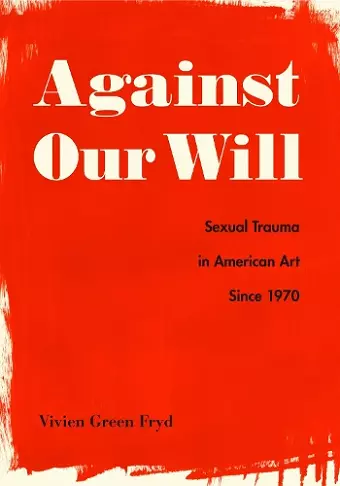Against Our Will
Sexual Trauma in American Art Since 1970
Format:Hardback
Publisher:Pennsylvania State University Press
Published:5th Feb '19
Currently unavailable, and unfortunately no date known when it will be back

Explores the work of American artists since 1970 who have created an anti-rape, anti-incest counternarrative in opposition to the acceptance of sexual violence against women.
As part of the feminist movement of the 1970s, female artists began consciously using their works to challenge social conceptions and the legal definitions of rape and incest and to shift the dominant narrative of violence against women. In this dynamic book, Vivien Green Fryd charts this decades-long radical intervention through an art-historical lens.
Fryd shows how American artists such as Suzanne Lacy, Leslie Labowitz, Faith Ringgold, Judy Chicago, and Kara Walker insisted on ending the silence surrounding sexual violence and helped construct an anti-rape, anti-incest counternarrative that remains vibrant today. She looks at how second-wave feminist artists established and reiterated the importance of addressing sexual violence against women and how their successors in the third wave then framed their works within that visual and rhetorical tradition. Throughout, Fryd highlights specific themes—rape and incest against white and black female bodies, rape against white and black male bodies, rape and pornography—that intersect with other challenges to and critiques of the sociocultural and political patriarchy from the 1970s through the present day.
Featuring dozens of illustrative works and written by an art historian who is a scholar of PTSD and herself a survivor, this groundbreaking and timely project explores sexual violence as a discrete subject of American art with open eyes and unflinching analysis. Against Our Will challenges the reader to serve as witness to the trauma in much the same way as the works Fryd studies.
“In art communities that rarely discuss sexual trauma, even as it occurs within the communities, and in a cultural climate in which the #MeToo movement remains necessary, Fryd’s book provides survivors of sexual trauma and their allies with deserved acknowledgement and sometimes cathartic release.”
—Jennifer Remenchik Hyperallergic
“Highly recommended for academic libraries serving art history, women’s and gender studies, pan-African studies, or other units with an interest in intersectional feminism, racial justice, social justice, or art.”
—Alex O’Keefe ARLIS/NA Reviews
“Pairing trauma theory with detailed analysis of American art focused on sexual violence, Fryd’s study is a timely and compelling contribution to ongoing conversations about the intersections of images and actions, art as social and political catalyst, and the impact of feminist thought in contemporary American culture.”
—Erika Doss, author of American Art of the 20th–21st Centuries
“Reading [this book] now is simultaneously illuminating and painful, an acute reminder of how far we’ve come in the decades since, yet also of how mired in the same problems we remain. What stands out is the fearlessness of the early female performance artists and the extent to which their work shaped how we think about art today.”
—Jillian Steinhauer The New Republic
“Eminently worthy of serious reading by art historians, sexual trauma therapists, and anyone interested in the history of women’s struggle to combat rape culture. The depth of research and validity of arguments regarding works developed in the 1970s and by black artists are formidable, as is the thesis that repetition is a strategy of artists working with the subject of rape. For the first author to explore the uncharted territory of art on rape, where all research is new, Fryd’s accomplishment is laudable.”
—Monika Fabijanska Woman's Art Journal
“Fryd urges us to take seriously the impact of all forms of sexual violence on our society, while encouraging us to consider how art might serve as a source for constructive public dialogue and even a catalyst for change.”
—Lesley Shipley Panorama
“By naming her book after Susan Brownmiller’s history of rape from 1975, Fryd pays homage to this groundbreaking work and echoes the now widely accepted idea that rape is a crime about power.”
—Rachel Middleman Burlington Magazine
ISBN: 9780271082066
Dimensions: 254mm x 178mm x 254mm
Weight: 1247g
368 pages